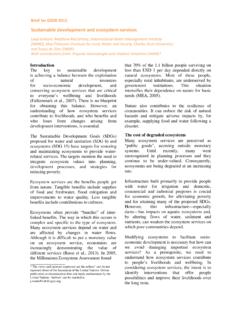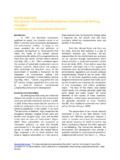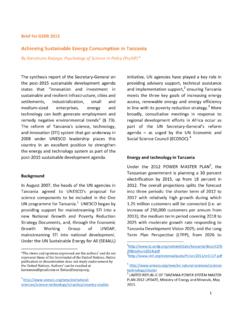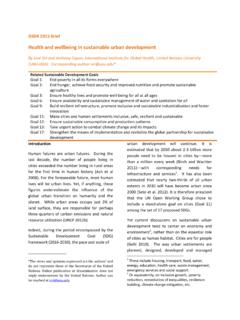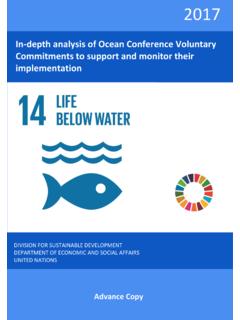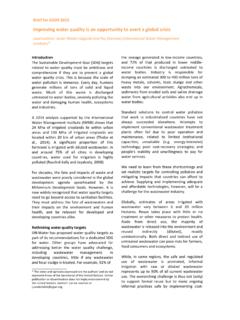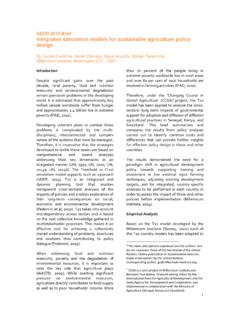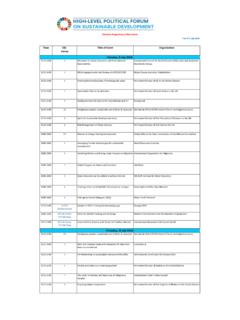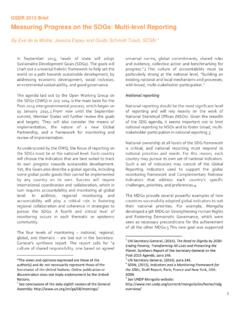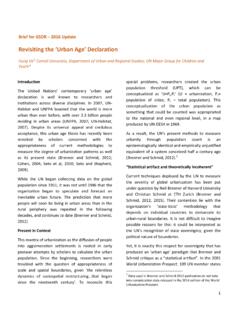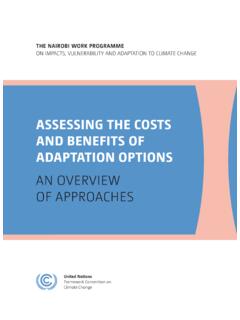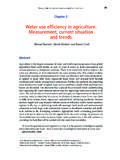Transcription of Our Common Future: Report of the World Commission on ...
1 Report of the World Commission on Environment andDevelopment: Our Common FutureTable of ContentsAcronyms and Note on TerminologyChairman's ForewordFrom One Earth to One WorldPart I. Common ConcernsA Threatened and Approaches to Environment and Sustainable Concept of Sustainable and the Common Role of the International International Economy, the Environment, in the Sustainable Sustainable World II. Common ChallengesPopulation and Human Links with Environment and Population Policy Security: Sustaining the of for Sustainable Food for the and Ecosystems: Resources for Problem: Character and Patterns and Causes of Values at Approach: Anticipate and Action for National for National Need for : Choices for Environment and , Economy, and Fuels: The Continuing Energy: Unsolved Fuels: The Vanishing Energy: The Untapped Efficiency: Maintaining the Conservation : Producing More With Growth and its Industrial Development in a Global for Sustainable Industrial Urban Growth of Urban Challenge in Developing III.
2 Common EndeavoursManaging The : The Balance of : A Key to Planetary : Towards Global , Security, Development, and the Stress as a Source of as a Cause of Unsustainable Security and Sustainable Common Action: Proposals For Institutional and Challenge for Institutional and Legal for Institutional and Legal Call for 1: Summary of Proposed Legal Principles forEnvironmental Protection and Sustainable Development Adoptedby the WCED Experts Group on Environmental LawAnnexe 2: The Commission and its WorkThroughout this Report , quotes from some of the many people who spoke at WCED publichearings appear in boxes to illustrate the range of opinions the Commission was exposed toduring its three years of work. They do not necessarily reflect the views of the Common Future, Chairman's Foreword"A global agenda for change" - this was what the World Commission on Environment andDevelopment was asked to formulate. It was an urgent call by the General Assembly of theUnited Nations:to propose long-term environmental strategies for achieving sustainable developmentby the year 2000 and beyond;to recommend ways concern for the environment may be translated into greaterco-operation among developing countries and between countries at different stages ofeconomical and social development and lead to the achievement of Common andmutually supportive objectives that take account of the interrelationships betweenpeople, resources, environment, and development;to consider ways and means by which the international community can deal moreeffectively with environment concerns.
3 Andto help define shared perceptions of long-term environmental issues and theappropriate efforts needed to deal successfully with the problems of protecting andenhancing the environment, a long term agenda for action during the coming decades,and aspirational goals for the World I was called upon by the Secretary-General of the United Nations in December 1983 toestablish and chair a special, independent Commission to address this major challenge to theworld community, I was acutely aware that this was no small task and obligation, and that myday-to day responsibilities as Party leader made it seem plainly prohibitive. What the GeneralAssembly asked for also seemed to be unrealistic and much too ambitious. At the same time, itwas a clear demonstration of the widespread feeling of frustration and inadequacy in theinternational community about our own ability to address the vital global issues and dealeffectively with fact is a compelling reality, and should not easily be dismissed.
4 Since the answers tofundamental and serious concerns are not at hand, there is no alternative but to keep on tryingto find this was on my mind when the Secretary-General presented me with an argument to whichthere was no convincing rebuttal: No other political leader had become Prime Minister with abackground of several years of political struggle, nationally and internationally, as anenvironment minister. This gave some hope that the environment was not destined to remaina side issue in central, political decision the final analysis, I decided to accept the challenge. The challenge of facing the future, andof safeguarding the interests of coming generations. For it was abundantly clear: We needed amandate for live in an era in the history of nations when there is greater need than ever forco-ordinated political action and responsibility. The United Nations and its Secretary-Generalare faced with an enormous task and burden. Responsibly meeting humanity's goals andaspirations will require the active support of us reflections and perspective were also based on other important parts of ray own politicalexperience: the preceding work of the Brandt Commission on North South issues, and thePalme Commission on security and disarmament issues, on which I was being asked to help formulate a third and compelling call for political action: AfterBrandt's Programme for Survival and Common Crisis, and after Palme's Common Security,would come Common Future.
5 This was my message when Vice Chairman Mansour Khalid andI started work on the ambitious task set up by the United Nations. This Report , as presented tothe UN General Assembly in 1987, is the result of that our most urgent task today is to persuade nations of the need to return tomultilateralism. The challenge of reconstruction after the Second World War was the realmotivating power behind the establishment of our post-war international economic challenge of finding sustainable development paths ought to provide the impetus - indeedthe imperative - for a renewed search for multilateral solutions and a restructuredinternational economic system of co-operation. These challenges cut across the divides ofnational sovereignty, of limited strategies for economic gain, and of separated disciplines a decade and a half of a standstill or even deterioration in global co-operation, I believethe time has come for higher expectations, for Common goals pursued together, for anincreased political will to address our Common was a time of optimism and progress in the 1960s, when there was greater hope for abraver new World , and for progressive international ideas.
6 Colonies blessed with naturalresources were becoming nations. The locals of co-operation and sharing seemed to beseriously pursued. Paradoxically, the 1970s slid slowly into moods of reaction and isolationwhile at the same time a series of UN conferences offered hope for greater co-operation onmajor issues. The 1972 UN Conference on the Human Environment brought the industrializedand developing nations together to delineate the "rights" of the human family to a healthy andproductive environment. A string of such meetings followed: on the rights of people toadequate food, to sound housing, to safe water, to access to means of choosing the size of present decade has been marked by a retreat from social concerns. Scientists bring to ourattention urgent but complex problems bearing on our very survival: a warming globe, threatsto the Earth's ozone layer, deserts consuming agricultural land. We respond by demandingmore details, and by assigning the problems to institutions ill-equipped to cope with degradation, first seen as mainly a problem of the rich nations and a side effectof industrial wealth, has become a survival issue for developing nations.
7 It is part of thedownward spiral of linked ecological and economic decline in which many of the poorestnations are trapped. Despite official hope expressed on all sides, no trends identifiable today,no programmes or policies, offer any real hope of narrowing the growing gap between rich andpoor nations. And as part of our "development", we have amassed weapons arsenals capable ofdiverting the paths that evolution has followed for millions of years and of creating a planetour ancestors would not the terms of reference of our Commission were originally being discussed in 1982, therewere those who wanted its considerations to be limited to "environmental issues" only. Thiswould have been a grave mistake. The environment does not exist as a sphere separate fromhuman actions, ambitions, and needs, and attempts to defend it in isolation from humanconcerns have given the very word "environment" a connotation of naivety in some politicalcircles. The word "development" has also been narrowed by some into a very limited focus,along the lines of "what poor nations should do to become richer", and thus again isautomatically dismissed by many in the international arena as being a concern of specialists, ofthose involved in questions of "development assistance".
8 But the "environment" is where we all live; and "development" is what we all do in attemptingto improve our lot within that abode. The two are inseparable. Further, development issuesmust be seen as crucial by the political leaders who feel that their countries have reached aplateau towards which other nations must strive. Many of the development paths of theindustrialized nations are clearly unsustainable. And the development decisions of thesecountries, because of their great economic and political power, will have a profound effectupon the ability of all peoples to sustain human progress for generations to critical survival issues are related to uneven development, poverty, and populationgrowth. They all place unprecedented pressures on the planet's lands, waters, forests, andother natural resources, not least in the developing countries. The downward spiral of povertyand environmental degradation is a waste of opportunities and of resources. In particular, it isa waste of human resources.
9 These links between poverty, inequality, and environmentaldegradation formed a major theme in our analysis and recommendations. What is needed nowis a new era of economic growth - growth that is forceful and at the same time socially andenvironmentally to the scope of our work, and to the need to have a wide perspective. I was very muchaware of the need to put together a highly qualified and influential political and scientific team,to constitute a truly independent Commission . This was an essential part of a successfulprocess. Together, we should span the globe, and pull together to formulate aninterdisciplinary, integrated approach to global concerns and our Common future. We neededbroad participation and a clear majority of members from developing countries, to reflectworld realities. We needed people with wide experience, and from all political fields, not onlyfrom environment or development and political disciplines, but from all areas of vital decisionmaking that influence economic and social progress, nationally and therefore come from widely differing backgrounds: foreign ministers, finance and planningofficials, policymakers in agriculture, science, and technology.
10 Many of the Commissioners arecabinet ministers and senior economists in their own nations, concerned largely with theaffairs of those countries. As Commissioners, however, we were acting not in our national rolesbut as individuals; and as we worked, nationalism and the artificial divides between"industrialized" and "developing", between East and West, receded. In their place emerged acommon concern for the planet and the interlocked ecological and economic threats withwhich its people, institutions, and governments now the time we met as a Commission , tragedies such as the African famines, the leak at thepesticides factory at Bhopal, India, and the nuclear disaster at Chernobyl, USSR appeared tojustify the grave predictions about the human future that were becoming commonplace duringthe mid-1980s. But at public hearings we held on five continents, we also heard from theindividual victims of more chronic, widespread disasters: the debt crisis, stagnating aid to andinvestment in developing countries, falling commodity prices and falling personal incomes.
